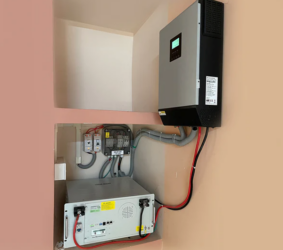
Modern life cannot function without an inverter, especially when the threat of power outages looms large. It can operate a range of electrical fixtures and equipment, ranging from fans and lamps to kitchen equipment, computers, and more, depending on the type of inverter you use. Your inverter works the way you need it to because of the battery. So who to choose the best inverter battery for home use?
A recommendation for choosing the optimal inverter & battery combination for your power needs:
First, determine your power needs.
Your “Power need” is one of the most crucial things to know before purchasing an inverter. Simply said, what electrical devices (such as fans, tube lights, televisions, CFLs, etc.) do you want to use in the event of a power outage? The power needed is calculated by adding the power used by all the electrical equipment. Let’s say you want one television, three fans, three tube lights, one CFL, and one to run in the event of a power outage.
Check the Inverter’s VA Rating.
Purchasing an inverter with the correct Volt Ampere (VA) rating is the next step. The term VA denotes the voltage and current that the inverter supplies to the appliances. So how can we determine the amount of VA that will meet our electrical needs? It could be better illustrated by the equation below, which compares the power factor of the inverter to the total amount of electricity used by the appliances. Power Factor/Power Requirement = VA
The power required by equipment to the power supplied by the inverter is known as the power factor. Inverters typically have a power factor of 0.7 or 0.8.
VA = 170/0.7 VA = approx. 242.85
We should therefore search for an inverter of about 250 VA in our case.
Identify the battery that your inverter needs.
The foundation of an inverter system is its battery. An inverter’s performance and lifespan are greatly influenced by the battery’s quality. How much backup an inverter will offer or how long it will take to run all of your equipment is the next important consideration. The battery capacity is what is described as such. The number of backup hours is determined by the battery capacity. It is said in Ah (Ampere Hours). Batteries with capacities of 100 Ah, 150 Ah, 180 Ah, and others are widely available on the market.
Solar batteries
You will require a solar battery with a C 10 rating if you have a solar inverter. Such a battery will store any extra energy generated by solar panels so that it can be used at a later time, like at night or during a power outage. If you intend to switch to solar power in the future, a premium solar battery will be a wise investment because it can function without a solar setup. Low maintenance requirements are provided by the high acid volumes in these batteries. They perform well at high temperatures as well since they are made of selenium low antimonial alloy. Other benefits include long battery life, quick charging, deep discharge recovery, anti-corrosiveness, and resistance to overheating. Any solar component’s cost, including the solar battery price, is based on factors like its capacity, brand, type, etc. A solar battery typically costs between Rs. 2,800 and about Rs. 13000.
If you don’t have any battery storage, the grid will step in to give much-needed power when the sun goes down and solar panels aren’t producing electricity. Utilizing more of your solar power at night with a solar battery will increase your energy independence and lower your monthly electric cost.
 Newspatrolling.com News cum Content Syndication Portal Online
Newspatrolling.com News cum Content Syndication Portal Online







